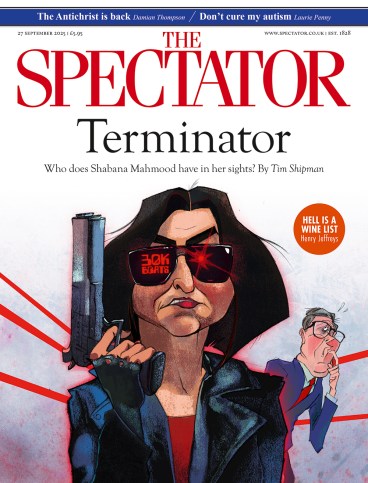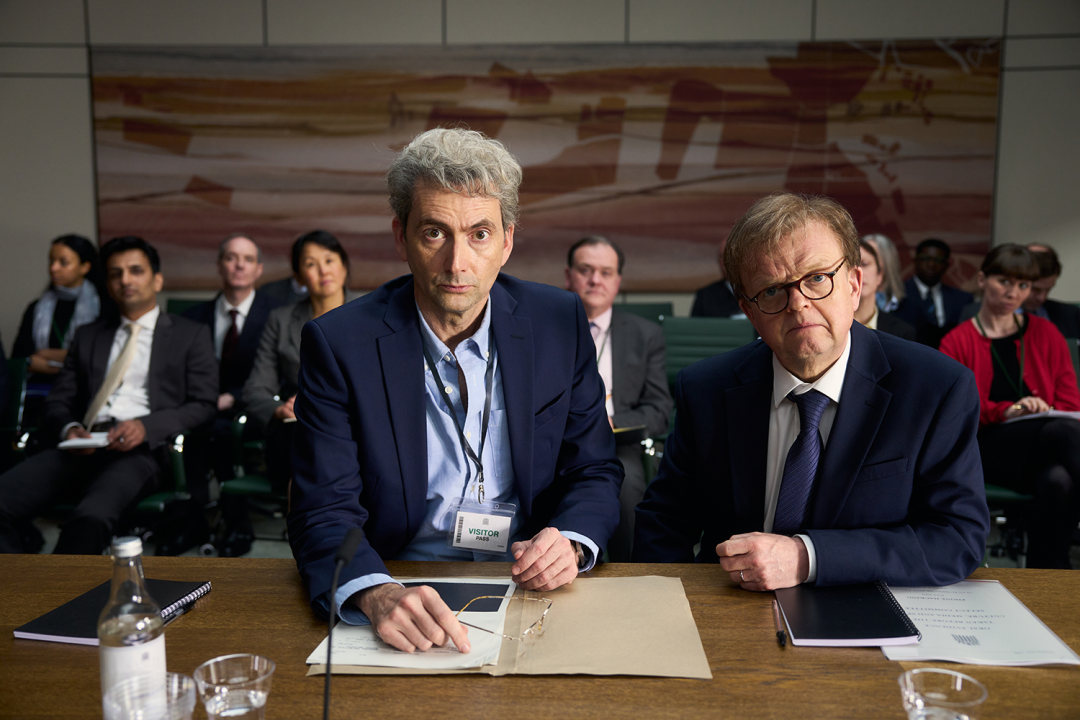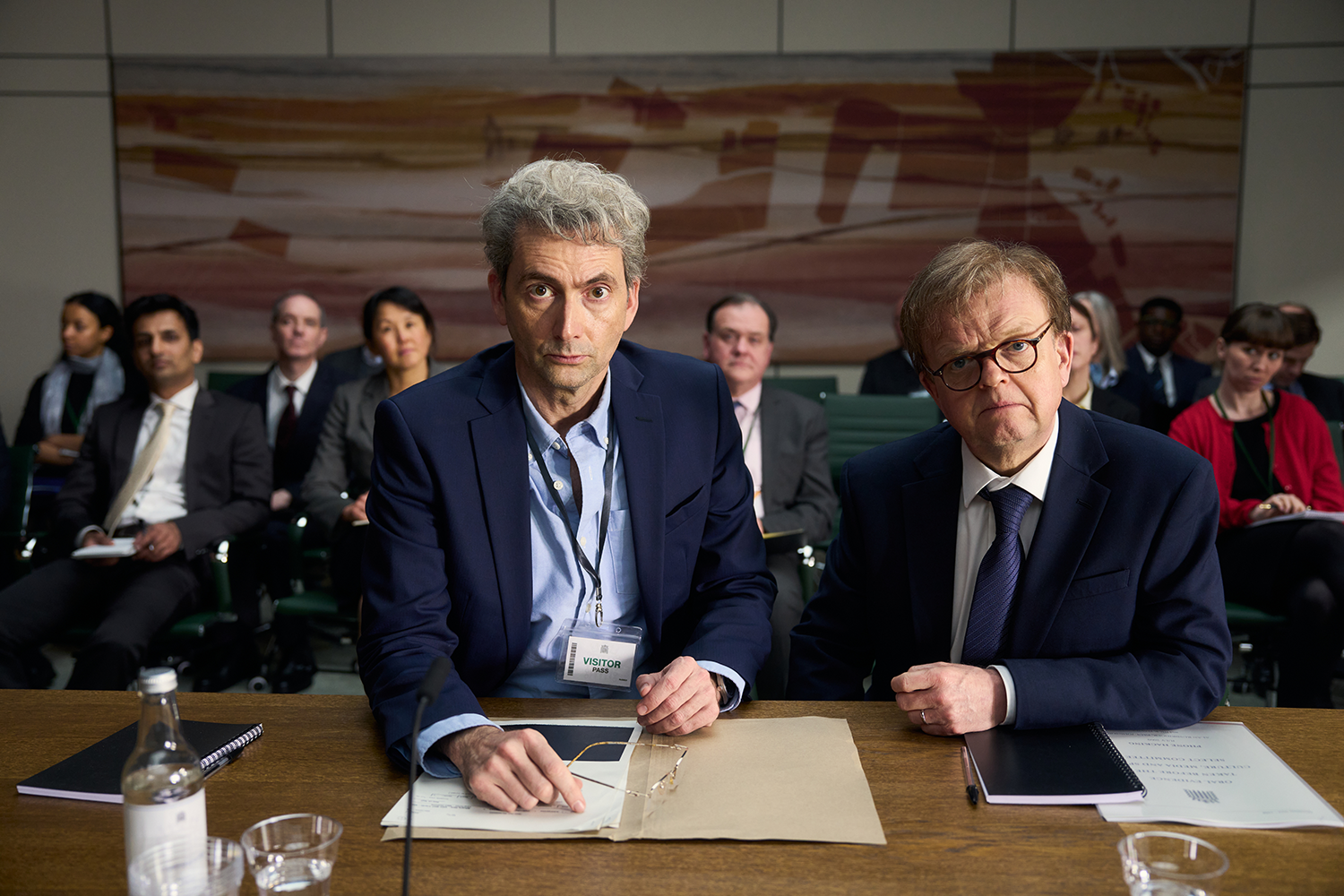
As we know, when terrestrial television has a big new hit these days, its response – once it’s got over the surprise – is to serve up a variation on the same formula. In the case of The Hack, the hit that inspired it is clearly Mr Bates vs the Post Office, as another real-life plucky underdog takes on a shadowy, powerful cabal – this time over phone-hacking – and struggles to get the story heard. In the first episode, the formula remained strong, but the variation bit fell somewhere between the unnecessary and the badly misguided.
The episode opened with a voice-over urging us to imagine a country where ‘people believe they are living in a democracy’, when in fact they’re ‘being abused by a treacherous combination of press, police and politicians’. The voice-over then revealed itself to be that of the Guardian journalist Nick Davies (David Tennant), who immediately decided that this opening was ‘florid nonsense’, deleted it from his computer screen and started again. Now he promised a story that ‘ended up with some of the most important people in this country being brought to their knees’, before rejecting that in turn as ‘too grand’.
This uncertainty about how to proceed neatly, if inadvertently, set the scene for what followed – because the programme turned out to share it. In its heart, you felt, it would rather have liked to be florid and grand – and occasionally gave into the temptation with far from disastrous results. On the whole, though, it was never confident enough that we’d care about celebs and Guardian journos the way we did about sub-postmasters, and so plumped for what it obviously considered a more viewer-friendly playfulness.
Within about ten minutes, the fourth wall was already a distant memory as Davies chatted away to us, both supplying lots of exposition and semi-parodying the supplying of lots of exposition. His early warnings about phone-hacking having been comprehensively dismissed on the Today programme by the News of the World’s managing editor, he was duly giving us the background history when he received a call from a man whose name was bleeped out. ‘Redacted, sorry. We’ll call him Mr Apollo,’ he told us before arranging a meeting with the man.
More somewhat strained playfulness ensued when Davies knocked on Mr Apollo’s door and it was successively opened by various celebs, from Gabby Logan to Jonathan Ross, whom some people had apparently guessed to be the real Mr A. (Davies has never revealed his identity.) Eventually, the genuine article, as played by Adrian Lester, invited him in and set him on his path to discovering that voicemail hacking was being done on an industrial scale.
Much digging later, Davies persuaded Guardian editor Alan Rusbridger (Toby ‘Mr Bates’ Jones) to run a story about the News of the World’s secret payout to one of the thousands of celebrities it had targeted. (Sadly, in these digital times, the traditional thundering of the presses was replaced by Rusbridger touching a button marked ‘Publish’.)
The programme was never confident enough that we’d care about celebs the way we did about sub-postmasters
And with that… well, not much happened. Murdoch-friendly MPs briefed that the Guardian couldn’t back up its story, the rest of the press ignored it and Rusbridger wished he’d never published it. Again, you could sense the programme’s anger about this – but, again, sensing it was about all you could do, the visual games continued and Rusbridger’s flipflopping was portrayed partly as comic.
Granted, there may be other reasons why a journalist would prefer dramas about heroic journalists to play it straight, but here I’d like to think mine are high-mindedly aesthetic. The story itself still comes across as an important and often gripping one, yet I do wish we didn’t have to peer at it through layers of narrative that somehow manage to feel effortful and timid at the same time.
Unfortunately for terrestrial TV fans (there are some of us left), ITV News at 70 was pretty timid too. Surely ITN’s achievements since 1955 have been significant enough for a proper exploration – over say, four episodes – of how Britain and news itself have evolved during that time; perhaps even with a side-order of boasting about what public service broadcasting can do. Instead, this was simply a one-off frantic whisk through seven decades, taken at such a lick that William and Kate’s wedding, the London Olympics and Andy Murray’s Wimbledon victory took up a total of 30 seconds between them.
At times, the juxtapositions created a slightly tasteless alternation between bad news and good news: on the one hand, the Asian tsunami killed thousands of people; on the other, England won the Rugby World Cup. At others, the mash-up became almost hallucinatory, so that you half-expected Neil Armstrong to say, ‘The lady’s not for turning’ or one of the Spice Girls to declare: ‘Mr Gorbechev, tear down this wall.’








Comments